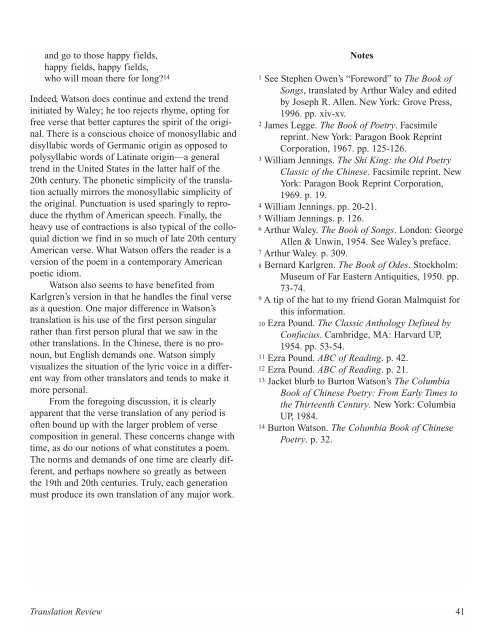Translation Review - The University of Texas at Dallas
Translation Review - The University of Texas at Dallas
Translation Review - The University of Texas at Dallas
Create successful ePaper yourself
Turn your PDF publications into a flip-book with our unique Google optimized e-Paper software.
and go to those happy fields,<br />
happy fields, happy fields,<br />
who will moan there for long? 14<br />
Indeed, W<strong>at</strong>son does continue and extend the trend<br />
initi<strong>at</strong>ed by Waley; he too rejects rhyme, opting for<br />
free verse th<strong>at</strong> better captures the spirit <strong>of</strong> the original.<br />
<strong>The</strong>re is a conscious choice <strong>of</strong> monosyllabic and<br />
disyllabic words <strong>of</strong> Germanic origin as opposed to<br />
polysyllabic words <strong>of</strong> L<strong>at</strong>in<strong>at</strong>e origin—a general<br />
trend in the United St<strong>at</strong>es in the l<strong>at</strong>ter half <strong>of</strong> the<br />
20th century. <strong>The</strong> phonetic simplicity <strong>of</strong> the transl<strong>at</strong>ion<br />
actually mirrors the monosyllabic simplicity <strong>of</strong><br />
the original. Punctu<strong>at</strong>ion is used sparingly to reproduce<br />
the rhythm <strong>of</strong> American speech. Finally, the<br />
heavy use <strong>of</strong> contractions is also typical <strong>of</strong> the colloquial<br />
diction we find in so much <strong>of</strong> l<strong>at</strong>e 20th century<br />
American verse. Wh<strong>at</strong> W<strong>at</strong>son <strong>of</strong>fers the reader is a<br />
version <strong>of</strong> the poem in a contemporary American<br />
poetic idiom.<br />
W<strong>at</strong>son also seems to have benefited from<br />
Karlgren’s version in th<strong>at</strong> he handles the final verse<br />
as a question. One major difference in W<strong>at</strong>son’s<br />
transl<strong>at</strong>ion is his use <strong>of</strong> the first person singular<br />
r<strong>at</strong>her than first person plural th<strong>at</strong> we saw in the<br />
other transl<strong>at</strong>ions. In the Chinese, there is no pronoun,<br />
but English demands one. W<strong>at</strong>son simply<br />
visualizes the situ<strong>at</strong>ion <strong>of</strong> the lyric voice in a different<br />
way from other transl<strong>at</strong>ors and tends to make it<br />
more personal.<br />
From the foregoing discussion, it is clearly<br />
apparent th<strong>at</strong> the verse transl<strong>at</strong>ion <strong>of</strong> any period is<br />
<strong>of</strong>ten bound up with the larger problem <strong>of</strong> verse<br />
composition in general. <strong>The</strong>se concerns change with<br />
time, as do our notions <strong>of</strong> wh<strong>at</strong> constitutes a poem.<br />
<strong>The</strong> norms and demands <strong>of</strong> one time are clearly different,<br />
and perhaps nowhere so gre<strong>at</strong>ly as between<br />
the 19th and 20th centuries. Truly, each gener<strong>at</strong>ion<br />
must produce its own transl<strong>at</strong>ion <strong>of</strong> any major work.<br />
Notes<br />
1 See Stephen Owen’s “Foreword” to <strong>The</strong> Book <strong>of</strong><br />
Songs, transl<strong>at</strong>ed by Arthur Waley and edited<br />
by Joseph R. Allen. New York: Grove Press,<br />
1996. pp. xiv-xv.<br />
2 James Legge. <strong>The</strong> Book <strong>of</strong> Poetry. Facsimile<br />
reprint. New York: Paragon Book Reprint<br />
Corpor<strong>at</strong>ion, 1967. pp. 125-126.<br />
3 William Jennings. <strong>The</strong> Shi King: the Old Poetry<br />
Classic <strong>of</strong> the Chinese. Facsimile reprint. New<br />
York: Paragon Book Reprint Corpor<strong>at</strong>ion,<br />
1969. p. 19.<br />
4 William Jennings. pp. 20-21.<br />
5 William Jennings. p. 126.<br />
6 Arthur Waley. <strong>The</strong> Book <strong>of</strong> Songs. London: George<br />
Allen & Unwin, 1954. See Waley’s preface.<br />
7 Arthur Waley. p. 309.<br />
8 Bernard Karlgren. <strong>The</strong> Book <strong>of</strong> Odes. Stockholm:<br />
Museum <strong>of</strong> Far Eastern Antiquities, 1950. pp.<br />
73-74.<br />
9 A tip <strong>of</strong> the h<strong>at</strong> to my friend Goran Malmquist for<br />
this inform<strong>at</strong>ion.<br />
10 Ezra Pound. <strong>The</strong> Classic Anthology Defined by<br />
Confucius. Cambridge, MA: Harvard UP,<br />
1954. pp. 53-54.<br />
11 Ezra Pound. ABC <strong>of</strong> Reading. p. 42.<br />
12 Ezra Pound. ABC <strong>of</strong> Reading. p. 21.<br />
13 Jacket blurb to Burton W<strong>at</strong>son’s <strong>The</strong> Columbia<br />
Book <strong>of</strong> Chinese Poetry: From Early Times to<br />
the Thirteenth Century. New York: Columbia<br />
UP, 1984.<br />
14 Burton W<strong>at</strong>son. <strong>The</strong> Columbia Book <strong>of</strong> Chinese<br />
Poetry. p. 32.<br />
<strong>Transl<strong>at</strong>ion</strong> <strong>Review</strong> 41

















